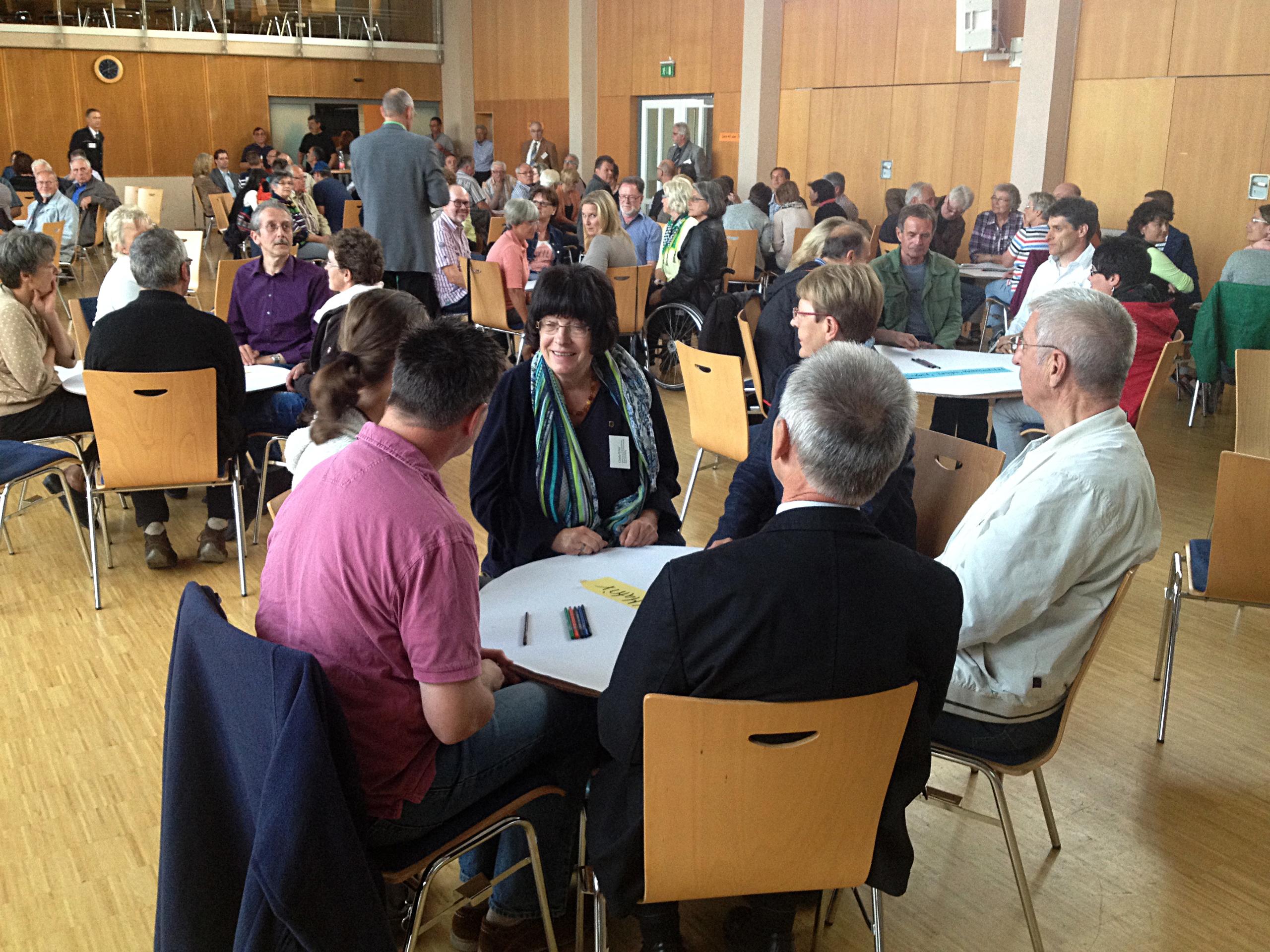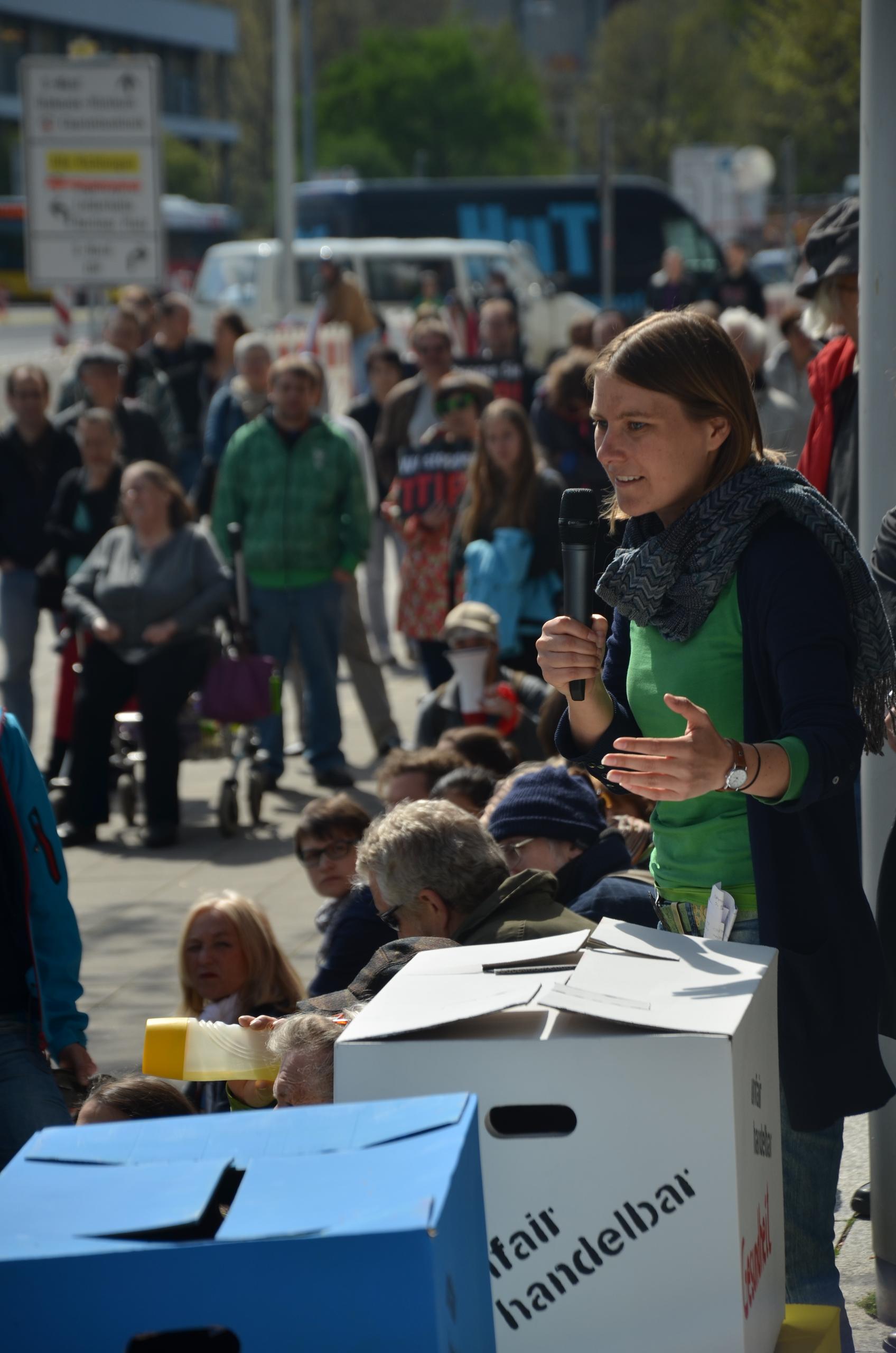
How a German state grapples with direct democracy

The government in the German state of Baden-Württemberg has received a mixed reaction for its efforts to boost direct democracy by lowering the threshold for referendums, introducing guidelines for citizens’ participation and expanding the curriculum at higher education colleges.
“We want to turn Baden-Württemberg into a model of democratic participation.” This ambitious pledge by the Green Party was made in a coalition agreement with the Social Democrats in 2011.
Germany’s third-largest state shares its southern border with Switzerland and its western border with France. It was shaken by a political earthquake four years ago.
He lost no time trying to regain the confidence of citizens in politics and presented a democratic reform agenda.
The non-governmental organisation, More Democracy (Mehr DemokratieExternal link), acknowledges Kretschmann’s popularity in opinion polls. The group is fighting for extended people’s rights both at a regional and a nationwide level in Germany.
Leverage effect
swissinfo.ch went to Stuttgart to find out more about the democracy offensive and first met Gisela Erler, who holds the title of State Councillor for Civil Society and Civic ParticipationExternal link, a novelty in Germany.
A member of the state cabinet, Erler acts as an interface between the different ministries. She is confident she can improve citizens’ participation in the state while furthering integration into the administrative process.
She highlights several government achievements: two new laws will come into force later this year, bringing down the turnout quota necessary to validate a public ballot.
The quorum is to be reduced to 20% from the current 33% and 25% for state-wide and local votes respectively. She praises the move as major step towards “realistic public ballots”, allowing Baden-Württemberg to catch up with other German states when it comes to lowering the threshold for democratic decisions.
Tens of thousands of citizens protested against the project Stuttgart 21 – a new railway station complex – between 2010 and 2011.
The costs for the project were budgeted at €2.5 billion (CHF2.6 billion) in 1995. By now official estimates reach €6.6 billion.
In 2011 the conservative Christian Democrats were voted out, paving the way for a Green/Social Democrat coalition.
In November 2011, voters rejected a proposal to suspend construction work. The new railway station complex is due to open in 2021.
At the same time, Baden-Württemberg is to lower the minimum age for people wishing to take part in local votes from 18 to 16.
In addition, any resident – not just German citizens – can demand the local authority table a particular issue in a public meeting.
Within limits
Citizen participation is crucial for Erler. It has to come at an early stage of the political process and it has to be binding and flexible, as she puts it.
Referring to the controversial construction of the new railway station, she says citizens have to be involved early on.
“It also means politicians have to listen to citizens, taking them seriously and taking into account public opinion – even if voters may not have the final say,” Erler continues, adding that flexibility is necessary to include all relevant interests without sticking to a set procedure.
Still, she says there are limits. “Highly controversial issues such as immigration, rescue programmes for the euro, territorial integrity or innovation – for instance the public funding of crèches – have to be exempt from public votes.”
Pointing to the current debate in Switzerland over a series of divisive initiatives, she adds: “Otherwise there is a risk that direct democracy can become dangerous.”
Driving force
Erler says she has also been pushing the public administration to become a second driving force for direct democracy in addition to citizens’ participation.
Special training programmes were included in the curriculum at administrative colleges.
“We are not trying to re-invent democracy. But we create a corridor to boost the expertise of administrative officials. It will help them implement citizens’ participation convincingly.”

By boosting efforts by civil society in refugee matters, Erler also hopes to defuse social tensions.
“We have made progress and we’re happy about the willingness of citizens to engage in public life,” Erler concludes, before heading to another appointment with journalists.
Public administration
Sarah Händel, director of the Baden-Württemberg chapter of the More Democracy NGO, commends Erler for her credibility and her “holisitic approach” to boost citizens’ trust in democratic institutions.
In particular, Händel highlights Erler’s effort to focus the government’s effort on education at administrative colleges.
“The civil servants know how to apply the idea of citizens’ participation and this helps increase awareness of direct democracy,” she says.
Händel also points to the guidelines for public planning projects – a first in Germany – as well as a regular exchange of opinion with scientists, notably the Swiss-based Centre for Democracy StudiesExternal link.
“The principle of citizens’ participation has to justify itself regularly. It not only costs time, effort and money but also makes decisions better, more sustainable and citizen-friendly,” she says.
Too slow
Despite the praise, Händel criticises the government of Baden-Württemberg. “Four years on, the reform pledges have still not been enshrined in law and no formal decisions have been taken,” she says.
Händel says an amended constitution for the state and regulations for the local authorities are the basic building blocks of democracy. Only in a direct democracy which is based on fairness and respect can citizens become fully empowered, she argues.
It is crucial to set solid foundations to extend participation without refusing to make compromises, Händel says.
Her criticism of the leftwing coalition government puts the main blame on the opposition conservative Christian Democratic Union, but she does not spare the Greens and the Social Democrats.
“It is very disappointing to see how quickly citizens’ participation was no longer a policy priority.”
The report from Stuttgart is the final part in a series on direct democracy in regions which border Switzerland.
Other features focus on the French region of Alsace and the northern Italian regions of South Tyrol and Trentino.
The texts were written ahead of the Europa Forum – a Swiss discussion platform on European issues – in Lucerne at the end of April. This year’s event debated the chances and challenges of the direct democracy system.
Adapted from German by Urs Geiser

In compliance with the JTI standards
More: SWI swissinfo.ch certified by the Journalism Trust Initiative





























You can find an overview of ongoing debates with our journalists here . Please join us!
If you want to start a conversation about a topic raised in this article or want to report factual errors, email us at english@swissinfo.ch.